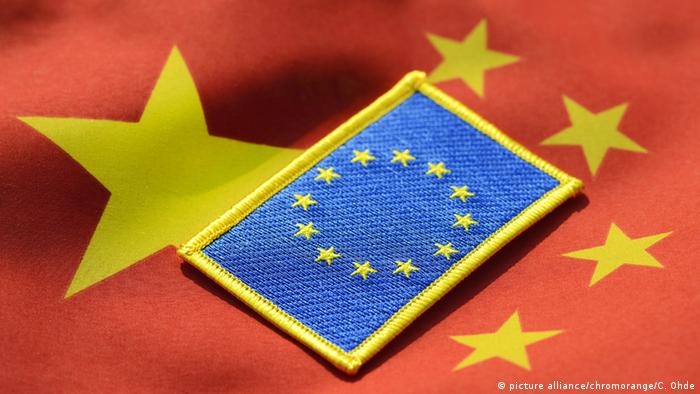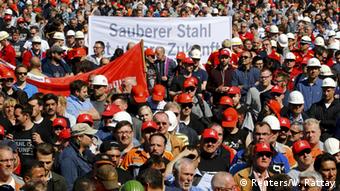China
EU-China summit: market economy and Brexit in focus
Two controversial topics at the EU-China summit in Beijing in focus: The impact of a Brexit on the cooperation and China’s recognition as a market economy. The had promised the EU for 2016.

“Our Commitments on the accession to the world trade organization in 2001, we have adhered to. Our obligations are met,” said China’s Prime Minister Li Keqiang in mid-June of 2016, after the Meeting with German Chancellor Angela Merkel, who visited China for the ninth Time. “Now others are in the series, to stand to the Promises,” demanded Li.

Li Keqiang: “the time has come for others to stand to their former Commitments to”
With “the other,” said Li of the European Union. A special provision in the accession to the WTO, China may not be recognized for a period of 15 years as a market economy. The deadline is the end of 2016. Now Brussels is on the train. The deadline of 2016 was announced, explains China expert Michael Schaefer, Chairman of the Board of the BMW Foundation in Berlin, “an automatism there are, however,”.
The current General conditions for endorsement of the recognition by the EU Commission are not good. According to the world trade organization between 1995 and 2014, a total of 119 EU initiated investigations against Chinese products. The procedure would not have been possible if China would be recognized as a market economy. It was the suspicion of price-dumping, for example, in the case of solar steel from China panels and Cheap. According to the unions, Dumping from China has destroyed a lot of jobs in the EU.
No policy consensus
On Monday (11.7.2016) urged the EU trade Commissioner Cecilia Malmstrom in Beijing, the establishment of a so-called “level playing field”, equal conditions of competition for European and Chinese investors on the Chinese market. To date, some industries are not, or are only restricted to foreign capital; such as financial services or the automotive industry.

Dr. Michael Schaefer: “An automatism, there is not”
An important prerequisite for the preferential status is that there is equal treatment of European companies in China, Chinese in Europe, says Schaefer, from 2007 to 2013, the German Ambassador to China. “Here in China, especially when issues such as market access, equal treatment in public tenders and the same investment terms and conditions you add. Just in the past two years, China has introduced restrictions for foreign companies, for example, in the case of tenders, which are still far from equal treatment.”
According to Volker Stanzel of the science and politics Foundation (SWP) in Brussels, the Unity, that it is due to the political importance of China for both sides would be sensible to comply with China’s request for recognition as a market economy. It’s just the economy, lack of political consensus. “Depending on the intensity of the economic relationships of individual EU member States to China, the concerns are different,” said Stanzel, who was from 2004 to 2007, the German Ambassador in Beijing.
Compromise in sight?
Chancellor Merkel referred to the Meeting with your counterpart in the middle of June, there is no clear Position. They responded to Li’s claim: Germany remember very good the time Commitments and she didn’t want to question it. Search you now, “the WTO-compliant solutions and also the economic problem”.
For a compromise to be found, according to evaluation of Stanzel, a middle ground. He is in an Interview with Deutsche Welle that the EU-Commission of China period, accorded the Status of a market economy, but at the same time a mechanism to take action against Dumping, as before, will allow.
A solution could be found in Beijing, belonging to the former Ambassador. “In Beijing, you know, of course, that China is no real market economy in the sense of the WTO. Rather, it is the symbolic value. The economic reality is not the compromise, because both sides are much more intertwined too much with each other.”

Dr. Volker Stanzel, a researcher at the Stiftung Wissenschaft und politik in Berlin
Brexit as an opportunity?
The result of the referendum in England to leave the European Union overshadowed the summit, on Tuesday (12.07.) in Beijing begins. After Germany the UK is one of the most important trading partner of China in the EU. Many Chinese companies use the advantages of location in England, in order to develop the pan-European markets. The UK as a location for Chinese investment abroad are very popular, among other reasons, because the required documents must only be available in English and most of the decision-makers are in China with the English language.
Prior to the referendum in England, China positioned itself with the principle, Beijing wants to see a “strong and United Europe”. The should have said to China’s President Xi Jinping during his recent England visit in October of 2015, compared to the British Prime Minister, David Cameron. Now after the Brexit Beijing must deal with the EU Delegation headed by EU Council President Donald Tusk and Commission President Jean-Claude Junker, the EU-China relations.
So far, many had large groups in China to London. China’s state-owned Bank ICBC took over in may from the British Bank Barclays the gold business, including a vault for the storage of up to 2000 tonnes of the precious metal. Now, however, China’s company would expand its Engagements in cities such as Frankfurt, or Paris, expert Stanzel.

Large-scale demonstration against cheap steel imports from China into Duisburg on the 11.04.2016
Also, the Europe expert Ling Shen, a Junior Professor at the East China Technical University in Shanghai, sees great Potential for the EU and China. In a guest contribution for the Deutsche Welle in Chinese language, Shen writes: “According to the Brexit China and Europe are more dependent than ever on cooperation. The exit of England from the EU and the possible consequences to bring many uncertainties, which makes an in-depth partnership.”
China could benefit England, however, continued as a “springboard” for the countries with which England is expanding its relations, believes Stanzel, not to bring if so soon, “the bilateral treaties between China and England, it is much, much need time. This can give many problems, one of which you can now still have no idea.”

